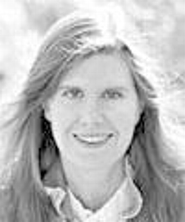
Sandra Steingraber, Distinguished Visiting Scholar at Ithaca College, will give a lecture titled "Living Downstream," on Tuesday, Sept. 25, at 7:30 p.m. in the Filllius Events Barn at Hamilton College. The lecture, which is free and open to the public, is sponsored by the Diversity and Social Justice Project at Hamilton College and the Kirkland Endowment.
Ecologist, author and cancer survivor, Steingraber is an internationally recognized expert on the environmental links to cancer and reproductive health. Her highly acclaimed book, Living Downstream: An Ecologist Looks at Cancer and the Environment, presents cancer as a human rights issue. It was the first to bring together data on toxic releases with newly released data from U.S. cancer registries. Living Downstream won praise from national and international media, including The Washington Post, the Nation, The Chicago Tribune, The Lancet and The London Times.
Continuing the investigation begun in Living Downstream, Steingraber's new work, Having Faith: An Ecologist's Journey to Motherhood, explores the intimate ecology of motherhood. Both a memoir of her own pregnancy and an investigation of fetal toxicology, Having Faith reveals the alarming extent to which environmental hazards now threaten each crucial stage of infant development. In the eyes of an ecologist, the mother's body is the first environment for human life. The Library Journal selected Having Faith as one of its best books of 2001. In 2002, it was featured on "Kids and Chemicals," a PBS documentary by Bill Moyers.
Steingraber received her doctorate in biology from the University of Michigan and master's degree in English from Illinois State University. She is the author of Post-Diagnosis, a volume of poetry, and coauthor of a book on ecology and human rights in Africa, The Spoils of Famine. Steingraber has taught biology at Columbia College, Chicago, held visiting fellowships at the University of Illinois, Radcliffe/Harvard, and Northeastern University, and served on President Clinton's National Action Plan on Breast Cancer. In 1997, Steingraber was named a Ms. Magazine Woman of the Year.
Ecologist, author and cancer survivor, Steingraber is an internationally recognized expert on the environmental links to cancer and reproductive health. Her highly acclaimed book, Living Downstream: An Ecologist Looks at Cancer and the Environment, presents cancer as a human rights issue. It was the first to bring together data on toxic releases with newly released data from U.S. cancer registries. Living Downstream won praise from national and international media, including The Washington Post, the Nation, The Chicago Tribune, The Lancet and The London Times.
Continuing the investigation begun in Living Downstream, Steingraber's new work, Having Faith: An Ecologist's Journey to Motherhood, explores the intimate ecology of motherhood. Both a memoir of her own pregnancy and an investigation of fetal toxicology, Having Faith reveals the alarming extent to which environmental hazards now threaten each crucial stage of infant development. In the eyes of an ecologist, the mother's body is the first environment for human life. The Library Journal selected Having Faith as one of its best books of 2001. In 2002, it was featured on "Kids and Chemicals," a PBS documentary by Bill Moyers.
Steingraber received her doctorate in biology from the University of Michigan and master's degree in English from Illinois State University. She is the author of Post-Diagnosis, a volume of poetry, and coauthor of a book on ecology and human rights in Africa, The Spoils of Famine. Steingraber has taught biology at Columbia College, Chicago, held visiting fellowships at the University of Illinois, Radcliffe/Harvard, and Northeastern University, and served on President Clinton's National Action Plan on Breast Cancer. In 1997, Steingraber was named a Ms. Magazine Woman of the Year.
Posted September 24, 2007
